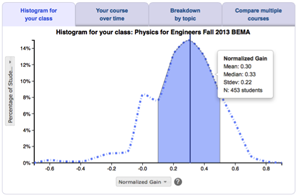
Developed by: David Hudgins, Kevin Lee, and Edward Prather

middle schoolhigh schoolintro collegeinter-mediateupper levelgrad school other

conceptual






Overview
What? Conceptual exercises in which students make comparative judgments to identify the order of various situations based on a physical outcome or result. Analyzing multiple scenarios requires students to think more deeply about the critical features that distinguish one situation from another.
Why? Ranking tasks have been validated across STEM disciplines as a tool to promote spatial cognition. NAEP Ranking Tasks provide "just enough" background information to encourage inductive/deductive processes while avoiding cognitive overload. Online or downloadable as pdf. Flash must be enabled.
Why not? Limited number of topics available.
Student skills developed
- Conceptual understanding
Instructor effort required
- Low
Resources
Teaching Materials
You can download ranking tasks for introductory astronomy for free from Astronomy Education at the University of Nebraska Lincoln or from the Center for Astronomy Education.
Research
This is the third highest level of research validation, corresponding to:
- at least 1 of the "based on" categories
- at least 1 of the "demonstrated to improve" categories
- at least 1 of the "studied using" categories
Research Validation Summary
Based on Research Into:
- theories of how students learn
- student ideas about specific topics
Demonstrated to Improve:
- conceptual understanding
- problem-solving skills
- lab skills
- beliefs and attitudes
- attendance
- retention of students
- success of underrepresented groups
- performance in subsequent classes
Studied using:
- cycle of research and redevelopment
- student interviews
- classroom observations
- analysis of written work
- research at multiple institutions
- research by multiple groups
- peer-reviewed publication




